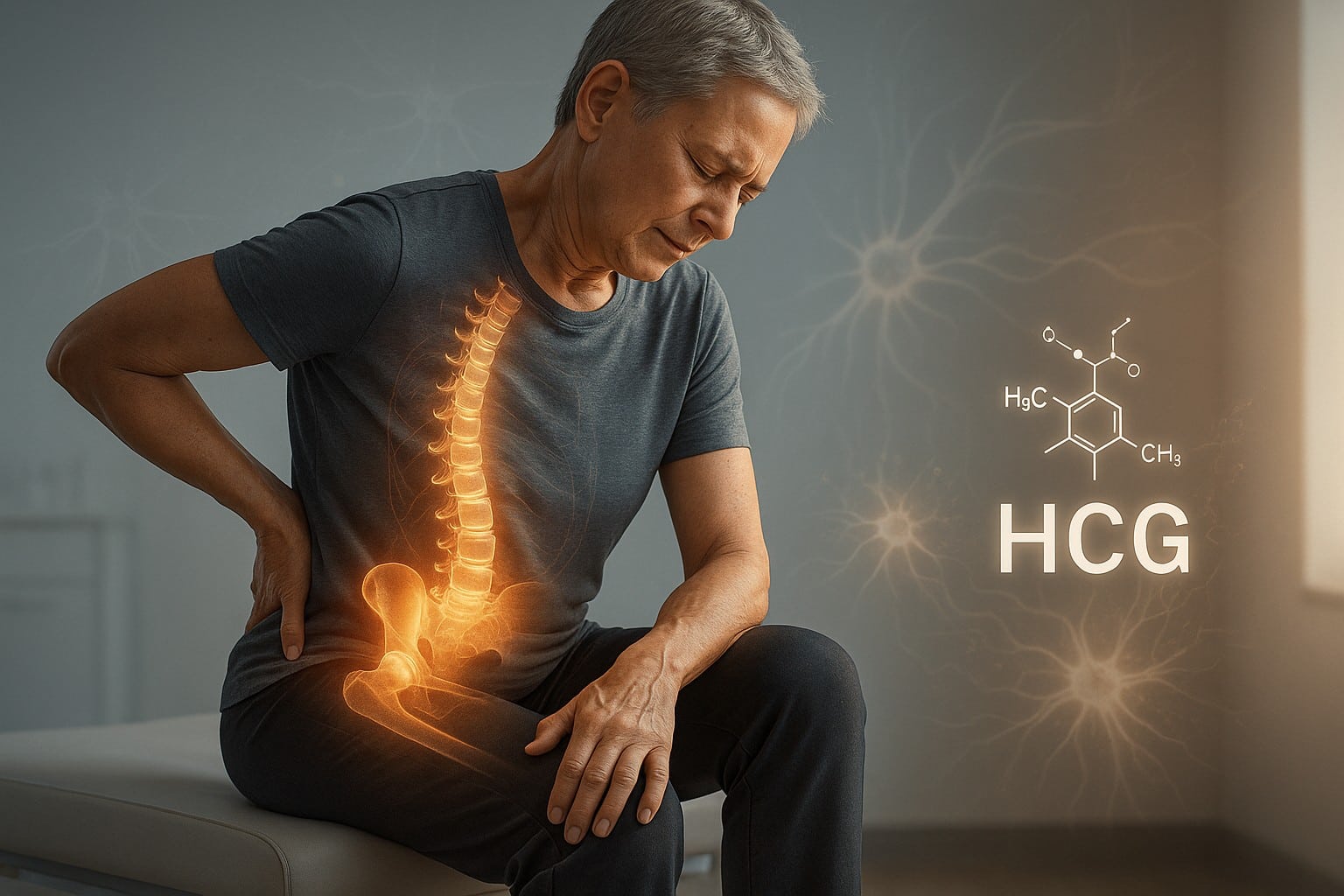HCG for Chronic Pain

Chronic pain affects nearly 80 million people in the U.S., according to the National Institutes of Health (NIH), and it's the most common cause of long-term disability and the most common reason for seeing the doctor. The American Academy of Pain Medicine says chronic pain affects more Americans than cancer, heart disease and diabetes combined not terribly surprising since all of these conditions often involve long-term, persistent or recurrent pain.
For years, managing chronic pain and finding at least some degree of relief meant committing to a long-term course of pain medications and exposing oneself to serious side effects, including addiction. Fortunately, recent research into the nature of pain and its physiological genesis has led to new therapies based on safer, more natural approaches to pain management, including (perhaps somewhat surprisingly) the use of human chorionic gonadotropin (hCG), a naturally-occurring hormone that's produced during pregnancy. In fact, hCG is so prevalent during pregnancy, it's the basis of blood testing used to confirm pregnancy. During pregnancy, hCG helps promote the development of a healthy placenta so the developing fetus receives the nutrients it needs for normal growth. Studies show it may also play a role in helping the baby develop a healthier immune system and prevent it from being attacked by the mother's own immune system during the initial stages of pregnancy. And it's commonly used as a fertility drug to increase sperm production or to promote ovulation in couples who have trouble conceiving.
Even though hCG is an exceptionally common hormone, most people would probably never have heard of it until several high-profile sports dopingcases made national headlines in recent years. In addition to its effects on pregnant women and their unborn babies, hCG helps stimulate the production of natural testosterone. Athletes who use synthetic steroids often begin hCG therapy at the end of a steroid cycle to jump start the production of natural testosterone and restore a normal hormonal balance, and hCG can be used on its own to enhance performance. Plus, because hCG boosts production of natural testosterone, hCG use is sometimes suggested to try to fool drug tests by masking levels of steroids in the blood. And that's led to a lot of negative publicity for what is actually a naturally-occurring hormone that offers a lot of positive benefits when used correctly and under a doctor's supervision.
HCG is naturally produced by the placenta, and it's also found in the urine of pregnant women. But that's not the only place it's found. An hCG variant also is produced in the pituitary gland in both women and men. Pituitary hCG is sometimes referred to as luteinizing hormone (LH).
In the lab, hCG can be created using synthetic chemicals or using DNA replication methods and natural animal sources to create natural hCG.
In a nutshell, hCG helps manage chronic pain by regulating the neural signal pathways that carry pain sensations from one part of the body to the brain, where those signals are interpretedas pain. As early as 130 A.D., Greek physician Galen recognized that some nerves were responsible for pain sensations and linked painful sensations with the brain. Although today, the presence of special pain receptornerves (nociceptors) has been well established, researchers are still learning about the complex series of events and reactions that trigger pain,
especially in chronic pain and pain syndromes like fibromyalgia which have no specific, identifiable genesis
Today, researchers know that while pain sensations do travel down specific pathways to the brain, there's a lot more going on when we experience pain on a regular, or chronic, basis. Recent research exploring the complex pain cascade has focused on the role of neuroplasticity, the ability of the nervous system to adapt over time, especially when repeatedly exposed to stimuli. While neuroplasticity can be beneficial in restoring neural connections lost to injury or disease, In chronic pain, negative neuroplastic responses can develop as the nerves learnto adapt to pain and to experience pain as part of their normal function. In essence, these nerves learn to signal or amplify pain. Disrupting this negative chain can helps nerves relearn how to function without continually triggering those pain signals. And that's where hCG comes in.
HCG is composed of two amino acids: one that acts to stimulate the thyroid and promote fertility and one that regulates specific physiological responses associated with pain. This second amino acid has an effect on two other physiological factors implicated in pain: cAMP (cyclic adenosine monophosphate) and nitric oxide, or NO.
cAMP pathways are secondary messaging signaling pathways that are involved in the chemical reactions that open and close gated ion channels, collecting and carrying pain signals to the brain. Interrupting or interfering with cAMP pathways disrupts the pain signaling processes to help control and regulate pain. Nitric oxide is a neurotransmitter that plays an integral role in pain sensations. While its physiological effects in pain management are complex, in general, NO acts to inhibit the perception of pain in both the central nervous system (the spinal cord and brain) and the peripheral nervous system the part of the nervous system that serves the hands, feet, legs, arms, organs and every other area of the body outside the central nervous system.
In addition to relieving pain by modulating the pain sensory and response process, hCG offers patients another significant benefit by enabling them to reduce or eliminate their reliance on addictive opioid medications, which in and of themselves pose serious health risks when used for a long period of time.
Although hCG is not approved by the FDA for the management of chronic pain, plenty of doctors are using hCG off label to help men and women relieve pain, increase mobility and function, reduce their use of opioid pain medicines, and improve their quality of life. For instance, in one study of eight patients with chronic intractable pain, hCG was administered for one year at a dose of 1,000 to 3,000 units per week.
At the end of one year, all patients treated with hCG reported improvement in pain flares, depression, energy, and concentration and memory. In addition, seven of the patients were able to reduce their use of opioids by 30% to 50%, and no side effects were reported or observed.

In the meantime, researchers are still learning how hCG works to affect what is an astoundingly complex physiological chain of events. Continuing research will focus on the optimal use of hCG in pain management as well as helping to determine the best therapeutic dosages and regimens
If you would like to write a prescription for hCG, please prescribe the following:
hCG 10,000 unit vial for injection Inject 125 units subcutaneously 3 times a week. Increase dose each week until lesser opioid dose is required, less pain is perceived, or energy is increased. Maximum dose is 3000 units per week.
#1 vial x ____ refills


